Man Martin's Blog, page 96
August 12, 2015
Honey Do
 Nancy is in Pennsylvania this week at a conference, and I must admit, I was looking forward to some time as a "bachelor," when I'd have a little extra time to write and read, have a chance to watch my DVD of Bubba Ho-Tep and my only responsibilities would be scraping the steak grease off the stovetop before she got home.
Nancy is in Pennsylvania this week at a conference, and I must admit, I was looking forward to some time as a "bachelor," when I'd have a little extra time to write and read, have a chance to watch my DVD of Bubba Ho-Tep and my only responsibilities would be scraping the steak grease off the stovetop before she got home.Before she left, she said, "Don't forget - take up the trash Monday and the recycling Tuesday."
"Check."
"And write the cleaners a check. They'll be here Thursday."
"Got it."
"And could you clean out the pool? I told the neighbors they could use it Monday, but I want it looking nice for them."
"Right."
"And could you see what's wrong with the sprinkler timer? It doesn't seem to be working."
"Will do."
"You may have to go to Lowes for a new one."
"I will if I have to."
"While you're at Lowes maybe you could get some new rubber stoppers for the rain barrel. The old ones fell out."
"Good idea."
"Are you going to remember all this? Do you want me to write you a note."
"I'll remember."
"Which day does the trash go up?"
"Tuesday. No. Monday. I'll take it up Sunday night just to be sure."
"I'll write you a note."
So now I have a nice handy note reminding me of the various things she'd mentioned plus one or two more she happened to think of.
It's almost like having her here.
(Originally posted 2012)
Published on August 12, 2015 03:07
August 11, 2015
Shakespeare and the L Word
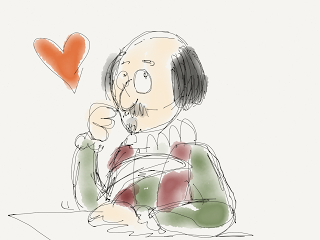 Vonnegut said that everything in a story should contribute either to the plot or to characterization. With respect to the better craftsman, I wonder if he's going far enough.
Vonnegut said that everything in a story should contribute either to the plot or to characterization. With respect to the better craftsman, I wonder if he's going far enough. Take Wild Bill Shakespeare. How many words will he expend, say, on pure characterization? As far as I can tell, none. A woman in love with a man, seems an obvious and worthwhile bit of characterization. Is it permissible for a writer to let a wife say she loves her husband, purely by way of establishing the relationship?
In Shakespeare, plenty of women tell men they love them, in plenty of different ways, but there's always something else at stake. They never say "I love you," unless they want something in return. (Much like real life in that way.) The L-Word in Shakespeare always comes with fine print - a "therefore."
Juliet: I love you; therefore let's defy both our families and get secretly married.
Desdemona: I love you; therefore, please don't kill me because I swear I'm innocent of anything you think I might have done and later you'll hate yourself for it, I guarantee.
Lady Macbeth: I love you; therefore, you need to quite shilly-shallying and go kill Duncan because we won't ever get a sweeter opportunity than this if you ever want to be king of Scotland.
Portia: (In Julius Caesar, not Merchant of Venice) I love you; therefore, you need to spill the beans about what's been eating you, which I'd never say out loud, but I'm pretty sure you plan to ill-kay Aesar-Say, which you'll never get away with not in a million years, so stop and think about it.
And men tell women they love them as well.
Richard: I love you; therefore, you should marry me, even though I'm physically repulsive and I killed your husband, whose body is right there in the coffin next to you, but in any case, I only killed him because I love you, as I already explained, and you should on no account suspect this is just a Machiavellian tactic on my part to bring me one step closer to the throne in a diabolical plot that will ultimately result in the deaths of almost the entire York family paving the way for someone named Henry whom no one has ever heard of until now.
These of course, are not actual lines, but generous paraphrases on my part.
It's not for nothing that the greatest writer in the English language was a dramatist. He knew if you really want to sell the popcorn, it's not enough for people to love each other. Stuff has to happen.
(Originally posted in 2012)
Published on August 11, 2015 02:54
August 10, 2015
Just Another Million-Dollar Idea
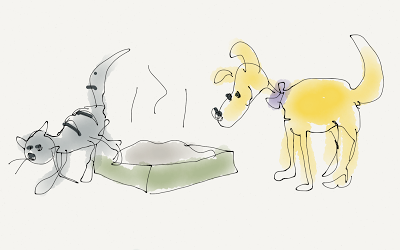 Readers of this blog are occasionally treated to sure-fire ideas to make a million dollars. Who knows how many wealthy Americans owe their starts to this blog. Donald Trump took my idea for surgically-implanted baseball caps on NASCAR fans and look how far it has taken him.
Readers of this blog are occasionally treated to sure-fire ideas to make a million dollars. Who knows how many wealthy Americans owe their starts to this blog. Donald Trump took my idea for surgically-implanted baseball caps on NASCAR fans and look how far it has taken him.My next idea is for a new dog food. According to the internet - and it must be true, it was on the internet - Americans spend twenty-one billion dollars on dog food last year. That's billion with a "b" just in case you were thinking of spelling it with a "y" or a "q."
Primarily this expense seems to be because dogs have joined the ranks of finicky eaters. This seems incredible, but it is so. When I was a child, I remember my neighbor Andy had a dog named Bo. They fed Bo out of a big bag labeled "chow," and whenever they poured a bowl of it, he'd suck it down like he'd never seen food before. For snacks, they'd pick off his ticks and feed them to him. He drank out of the toilet.
Our dog Zoe must eat two different kinds of food each meal - wet and dry. She needs flavor variety or she'll stop eating. Her food must be purchased at a special store that specializes in the sort of dog food she eats. Every so often, whatever we feed her, and however much it costs, she will get tired of it, and we'll have to search for a new brand. I have calculated that out of the twenty-one billion dollars Americans spend on dog food, the Martin household personally accounts for eleven billion.
So here's my idea.
Recently we got a cat. Now we have to keep the dog out of the sun-room because that's where the litter-box is. If you have a dog and a cat, and if the cat uses a litter box, you will understand why this is a problem.
To get an idea of how popular cat-litter is with dogs, I did a quick search on Amazon where I found no fewer than sixteen different treatments you can buy to prevent dogs from eating cat poop.
But here's my thought.
Cat-Poop flavored dog food.
Yes, laugh if you want to, but they laughed at the Wright Brothers when they invented the light bulb, too. They didn't laugh when George Foreman invented the George Foreman Grill because, hey, George Foreman. But they would've laughed. But later on, they wouldn't have been laughing when it made a million dollars. Same way with this. Don't come crying to me when you miss your opportunity.
Published on August 10, 2015 02:29
August 9, 2015
Notes for My Biography
I have compiled these brief notes in hopes that when I achieve the pinnacle of fame, which is my destiny, some future biographer will find them useful.
Man Martin was born in Ocala, Florida, in 1959, where his father was a high-ranking government official, and his mother, a famous (some say infamous) socialite and taste-maker whose salon was considered de rigeur in the demi-monde of the Central Florida literary set.
During the anarchist uprising of '66, an assassin's bullet found Martin's father in the midst of composing his great monograph exploring the genus of the cabbage palm, and Martin's mother fled with Man and his sisters - his brother Homer had already enlisted in the Resistance where he would win several medals of valor and the Distinguished Service Pin - to Fort Pierce, where she opened a fashionable tea room, serving, among others, Marcel Proust, Ernest Hemingway, and Frank Zappa. But two years later, the Germans rolled in, and the Martins had to flee once more.
Martin, nine years old by this time, had already written his first novel, and Gertrude Stein, one of his mother's patrons, who'd seen an unpublished manuscript, pronounced it a "work of genius." Unfortunately, in the hurry and confusion, the manuscript was left behind. Ezra Pound, who briefly occupied the house in the summer of '70 is believed to have found Martin's inchoate notes and used them to fashion his own masterpiece, Look Homeward Angel, which he published under the pen name of Herman Melville.
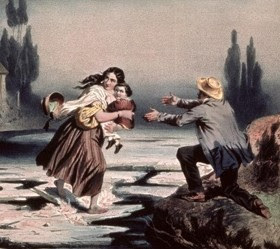 By this time, the young Man Martin had
By this time, the young Man Martin had
already written several novels
Martin's sister Helen had meanwhile discovered radium and won the Nobel Prize; unfortunately, owing to a bureaucratic mix-up, the check was sent to the neighbors, and times were tough for the Martins. Within two short years, they'd eaten the last of their sled dogs, and were seriously considering a case of pickled beets they had in the pantry and whether anything could be done to make these edible.
Martin's middle sister, Chris, writing under the pen name of George Eliot, had written some unflattering limericks about the commissar, in which she compared his nose to a corn-dog. The family had to flee once more, but by this time, they'd done so much fleeing, they were getting used to it. Chris changed her name to Nettie and embarked on an ambitious project to level the Taj Mahal and build an exact replica in the precise spot where it had once stood without anyone noticing. It is unclear whether she ever succeeded.
Meanwhile Martin had written five more novels and an opera. Alas, the notes for these were also left behind, and when Man asked could they please go back and get them, his mother said, they couldn't turn back now, and he should have thought of that before they fled, and he'd leave his own head behind if he didn't have it screwed on tight.
The manuscripts were later found by Wagner who turned them into operas. George Bernard Shaw found the opera and turned it into a play. Kurt Weill found the play and turned it back into an opera. This was was later adapted into a novel by Thomas Pynchon. The TV series airs this Spring on Netflix.
NEXT: Adolescence, A Troubled Time
(Originally posted 2012)
Man Martin was born in Ocala, Florida, in 1959, where his father was a high-ranking government official, and his mother, a famous (some say infamous) socialite and taste-maker whose salon was considered de rigeur in the demi-monde of the Central Florida literary set.
During the anarchist uprising of '66, an assassin's bullet found Martin's father in the midst of composing his great monograph exploring the genus of the cabbage palm, and Martin's mother fled with Man and his sisters - his brother Homer had already enlisted in the Resistance where he would win several medals of valor and the Distinguished Service Pin - to Fort Pierce, where she opened a fashionable tea room, serving, among others, Marcel Proust, Ernest Hemingway, and Frank Zappa. But two years later, the Germans rolled in, and the Martins had to flee once more.
Martin, nine years old by this time, had already written his first novel, and Gertrude Stein, one of his mother's patrons, who'd seen an unpublished manuscript, pronounced it a "work of genius." Unfortunately, in the hurry and confusion, the manuscript was left behind. Ezra Pound, who briefly occupied the house in the summer of '70 is believed to have found Martin's inchoate notes and used them to fashion his own masterpiece, Look Homeward Angel, which he published under the pen name of Herman Melville.
 By this time, the young Man Martin had
By this time, the young Man Martin had
already written several novels
Martin's sister Helen had meanwhile discovered radium and won the Nobel Prize; unfortunately, owing to a bureaucratic mix-up, the check was sent to the neighbors, and times were tough for the Martins. Within two short years, they'd eaten the last of their sled dogs, and were seriously considering a case of pickled beets they had in the pantry and whether anything could be done to make these edible.
Martin's middle sister, Chris, writing under the pen name of George Eliot, had written some unflattering limericks about the commissar, in which she compared his nose to a corn-dog. The family had to flee once more, but by this time, they'd done so much fleeing, they were getting used to it. Chris changed her name to Nettie and embarked on an ambitious project to level the Taj Mahal and build an exact replica in the precise spot where it had once stood without anyone noticing. It is unclear whether she ever succeeded.
Meanwhile Martin had written five more novels and an opera. Alas, the notes for these were also left behind, and when Man asked could they please go back and get them, his mother said, they couldn't turn back now, and he should have thought of that before they fled, and he'd leave his own head behind if he didn't have it screwed on tight.
The manuscripts were later found by Wagner who turned them into operas. George Bernard Shaw found the opera and turned it into a play. Kurt Weill found the play and turned it back into an opera. This was was later adapted into a novel by Thomas Pynchon. The TV series airs this Spring on Netflix.
NEXT: Adolescence, A Troubled Time
(Originally posted 2012)
Published on August 09, 2015 04:12
August 8, 2015
What NOT to Have Around the House
 What the hell am I ever going to do
What the hell am I ever going to dowith a salad-shooter?The secret to a happy life is to narrow down the number of possessions you feel you can't live without. When you get right down to it, why am I still holding on to all that old junk in the basement? Take for example, those nickle-plated thumbscrews. Yes, they're nice, and a great conversation-starter (no matter how reluctant someone is) but if I'm not going to use them, shouldn't I just donate them to Goodwill or something?
And this copy of the Necronomicon. It's completely falling apart. Human-skin binding just is not durable. When I was younger, I'd summon the Dark Lord Cthulhu every weekend just about, but I just don't have the time any more. I ought to just put this thing on Ebay and be done with it.
And the alligators. They're cute when they're little, but they grow up so fast. And that Purina Alligator-Chow costs a fortune. Not to mention Mr. Sniffles has an allergy, so you got to buy him the gluten-free alligator chow that costs even more. And don't even get me started on cleaning the litter box! You tell yourself how great it will be when you've dug the moat for them, but deep down, you know you'll never get around to it. It's time to say, "Sorry, Smiley, Mr. Sniffles, I'm sending you off to live with a nice family in the country."
And a salad-shooter. What the hell am I ever going to do with a salad-shooter? How does this thing even work? I took it out of the box one time, and I think it's already missing a part.
I used to have a complete set of bone-saws, really nice, tungsten steel, top-of-the-line, but my friend Scott borrowed them and never gave them back. But you know what? I don't even want them back. You can keep them, Scott. Just one less thing to gather dust.
And then there's this Abyss. You can barely move around down here without bumping into it. When you stare into the Abyss, it stares into you, which is pretty cool at first, but after a while, it's like, so what? And what do I need to be staring into Abysses for? I already have Netflix. It's just going to be such a hassle dragging it up to the road.
But I guaran-flat-tee you, that if I leave it at the curb for one day, some sucker will come along and throw it in the back of his truck and take it home. Then it'll be his Abyss.
Well, he can have it.
Published on August 08, 2015 06:12
August 7, 2015
Patterson: Let Me Teach You How to Write Good
 Merle Patterson writes conspicuously at the downtown Chamblee StarBucks on Side Street (just across the other StarBucks on Side Street). He is the author of several self-published e-novels, an e-collection of poems, an e-cookbook, and is at work on an e-autobiography, tentatively titled E-Me.
Merle Patterson writes conspicuously at the downtown Chamblee StarBucks on Side Street (just across the other StarBucks on Side Street). He is the author of several self-published e-novels, an e-collection of poems, an e-cookbook, and is at work on an e-autobiography, tentatively titled E-Me.A lots of people ask me if I have any rules for writing, and over the months since I've been a dedicated novelist I've boiled the whole thing down to five simple principles.
1. If you run out of stuff to say, you can always have your main character or someone think about stuff. In my last e-novel, for instance, my main character Chet Barkesdale, Private Eye, spends twenty pages just thinking about what to do with all that lint that comes out of a dryer. And I tell you, it's fascinating! And when he stops thinking about that, he thinks for another ten pages thinking about the fact he's got nothing to think about. I could write stuff like that for weeks!
2. Write what you know. This is very important. For example, I try to base all of my characters off of me in some way. Like, you take Bart Chetsdale, Wild West Sheriff. He's exactly like me if I was a sheriff in the wild west and had been trained in secret Indian ways by Bear Breaks Wind, a full-blooded Pawnee medicine man and then taught to sling two six-shooters by "Bad Bob" Bobby Bad, the ornieriest six-shooter slinger ever to sling two six-shooters. And a lot of Bart's thoughts are just the sort of thing I think about all the time. Like dryer lint. Did you know it can be used for fuel? I held a match to some of that stuff, and it went off like, WHOOM! Singed off my eyebrows.
3. Always have a surprise ending. Nothing worse than a dull, predictable ending, which is why you got to be sure to do something different. For example, in my e-sci-fi thriller, after twenty pages thinking about stuff, Clarke Dalebeck, Starfleet Captain, foils the evil Nimrodians by throwing a flaming lint ball in their faces and burning off their eyebrows! No one saw that coming, boy!
4. Use plenty of exclamation marks! I don't know why more people don't do this!! You take an ordinary hum-drum sentence like: "Look at all that lint." You can make it a real hum-dinger by throwing some exclamation marks on it. "Look at all that lint!!!!" CAPITALIZING EVERYTHING WORKS, TOO!!!
5. If you completely run out of ideas for story, take something someone's already written and do a word search, replacing out all the names of stuff with whatever you want. I've already written several e-masterpieces this way: "The Lint of Mount Kilamanjaro," "Moby Lint," and "Checksbeck of the D'Urberlint."
(Originally posted 2012)
Published on August 07, 2015 03:36
Franzen: Let Me Teach You How to Write Good
 Merle Franzen writes conspicuously at the downtown Chamblee StarBucks on Side Street (just across the other StarBucks on Side Street). He is the author of several self-published e-novels, an e-collection of poems, an e-cookbook, and is at work on an e-autobiography, tentatively titled E-Me.
Merle Franzen writes conspicuously at the downtown Chamblee StarBucks on Side Street (just across the other StarBucks on Side Street). He is the author of several self-published e-novels, an e-collection of poems, an e-cookbook, and is at work on an e-autobiography, tentatively titled E-Me.A lots of people ask me if I have any rules for writing, and over the months since I've been a dedicated novelist I've boiled the whole thing down to five simple principles.
1. If you run out of stuff to say, you can always have your main character or someone think about stuff. In my last e-novel, for instance, my main character Chet Barkesdale, Private Eye, spends twenty pages just thinking about what to do with all that lint that comes out of a dryer. And I tell you, it's fascinating! And when he stops thinking about that, he thinks for another ten pages thinking about the fact he's got nothing to think about. I could write stuff like that for weeks!
2. Write what you know. This is very important. For example, I try to base all of my characters off of me in some way. Like, you take Bart Chetsdale, Wild West Sheriff. He's exactly like me if I was a sheriff in the wild west and had been trained in secret Indian ways by Bear Breaks Wind, a full-blooded Pawnee medicine man and then taught to sling two six-shooters by "Bad Bob" Bobby Bad, the ornieriest six-shooter slinger ever to sling two six-shooters. And a lot of Bart's thoughts are just the sort of thing I think about all the time. Like dryer lint. Did you know it can be used for fuel? I held a match to some of that stuff, and it went off like, WHOOM! Singed off my eyebrows.
3. Always have a surprise ending. Nothing worse than a dull, predictable ending, which is why you got to be sure to do something different. For example, in my e-sci-fi thriller, after twenty pages thinking about stuff, Clarke Dalebeck, Starfleet Captain, foils the evil Nimrodians by throwing a flaming lint ball in their faces and burning off their eyebrows! No one saw that coming, boy!
4. Use plenty of exclamation marks! I don't know why more people don't do this!! You take an ordinary hum-drum sentence like: "Look at all that lint." You can make it a real hum-dinger by throwing some exclamation marks on it. "Look at all that lint!!!!" CAPITALIZING EVERYTHING WORKS, TOO!!!
5. If you completely run out of ideas for story, take something someone's already written and do a word search, replacing out all the names of stuff with whatever you want. I've already written several e-masterpieces this way: "The Lint of Mount Kilamanjaro," "Moby Lint," and "Checksbeck of the D'Urberlint."
(Originally posted 2012)
Published on August 07, 2015 03:36
August 6, 2015
Mockingbird
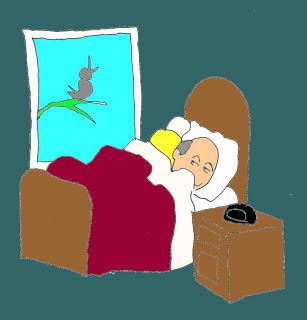 Saturday morning my alarm rang, I turned it off. I've been somewhat sleep-deprived lately, so I felt I'd earned the right to sleep late. And I did sleep late, too. Really late. It must've been, ooh, 6:00, 6:15 before I finally stumbled out of the rack.
Saturday morning my alarm rang, I turned it off. I've been somewhat sleep-deprived lately, so I felt I'd earned the right to sleep late. And I did sleep late, too. Really late. It must've been, ooh, 6:00, 6:15 before I finally stumbled out of the rack.What woke me up was a mockingbird outside my window, going through some vocal acrobatics. Don't mistake me, I cannot think of a more pleasant way to awaken. And this guy was going to town! I mean he was a crazy bird! He was going zinng-zinng! Powee! Kazoom! (Mockingbirds do not actually make any of these noises, but the actual noises he was making are irreproducible in print.)
Keats wrote a beautiful poem to a nightingale, which he fittingly titled, "Ode to a Nightingale," and in it, he gets off some pretty good lines, such as saying the song "ofttimes hath charm'd magic casements, opening on the foam of perilous seas, in faery lands forlorn." That's sort of the way it was for me. The mockingbird not only filled the air outside the window, it charmed the window itself. It would have been equally fitting to look out, hearing that wild ruckus, and see Narnia or Prydian, as Brookhaven, Georgia.
I guess they must not've had mockingbirds where Keats came from, or maybe he'd have written a poem about them instead. I'd like to write a poem about a mockingbird myself, except I don't write poems. I write blogs.
(Originally posted 2012)
Published on August 06, 2015 03:09
August 5, 2015
Shoe Dog
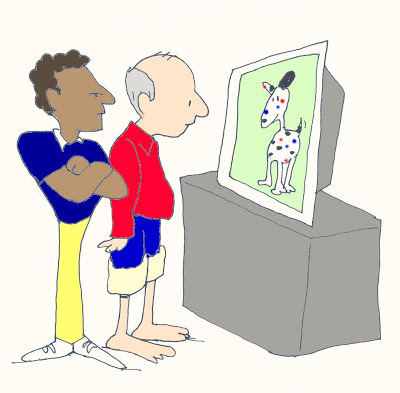 My daughter Spencer talked me into doing a triathlon sprint this summer. Actually, first she talked me into running with her, then by degrees she introduced the topic of a triathlon. I now realize my daughter would make a pretty good living as a dope-pusher.
My daughter Spencer talked me into doing a triathlon sprint this summer. Actually, first she talked me into running with her, then by degrees she introduced the topic of a triathlon. I now realize my daughter would make a pretty good living as a dope-pusher. Spencer took me to the store to get some new running shoe because the ones I had were no more suited for running than a reasonably comfortable pair of lace-up cinder-blocks. Nor could they be called "tennis shoes" unless one played the most desultory and lackluster style of tennis imaginable, one in which the ball is never allowed to bounce, but must roll back and forth under the net. Neither can they be called "sneakers" unless one is sneaking up on an especially lethargic and hearing-impaired sloth.)
At the store, I had to remove my shoes and socks and stand on a pair of footprints on a plastic pad. The salesman showed me a computer screen where we examined an infrared three-D image of my feet that showed how I distributed my weight. (The screen saver on this computer, I should mention, was a likable dalmatian, who, in addition to the regulation black spots, also had blue, green, and pink ones. His name, I was to learn, is Shoe Dog.) Having determined that I put most of my weight on my feet, the salesman conducted me to the second test, where I ran barefoot on a treadmill with my jeans rolled up my calves, making me feel like Huck Finn if Huck Finn ever got on a treadmill.
Back at the computer screen, Shoe Dog was wearing an apron and chef's hat, sitting before a large stockpot, with the caption, "Let's add a few more ingredients." The salesman analyzed keyed in more information, and the next thing we saw was Shoe Dog running in circles the way Zoe does when we're about to go for a walk. "Shoe Dog is excited," the salesman explained in a perfectly serious voice, "because we're about to pick out your new shoes."
I will cut the story short to say the shoes I ended up with are indeed a marvel; as soon as I put them on, they seemed to whisper to my feet, "Let's go!" But the chief joy of the outing was getting to meet Shoe Dog and the salesman's solemn assurance that Shoe Dog was excited just thinking about my getting some new shoes.
When I was a kid, there was a brand of shoes called Red Goose. For all I know, they still exist, but I haven't seen them in ages. When a kid got a new pair of Red Goose shoes, he also got to turn a crank on an over-sized gumball machine and pull out a big red plastic egg, inside of which was a prize. (The quality of the prize was better than something from a Cracker Jack box, but not much.)
Red Goose had the rather creepy slogan, "Half the fun of having feet is Red Goose shoes." But no matter. Shoe Dog has it all over Red Goose. If only every purchase could be accompanied by a happy dog chasing its tail, excited at the prospect of my getting something new:
"BP Dog's excited you're buying gasoline!"
"Birdseye Dog's excited you're getting frozen peas!"
(Originally posted 2012)
Published on August 05, 2015 03:18
August 4, 2015
Chicken Feed
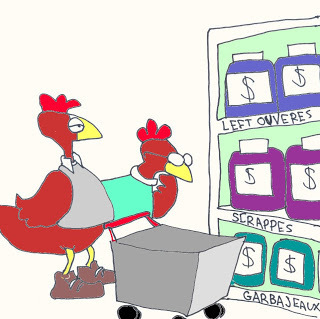 One of the challenges of suburban-chicken raising is finding chicken food. The nearest Tractor Supply, our preferred vender, is in McDonough, so when we visit my inlaws down that way, we try to pick up a bag. One time we ran out and had to resort to a fancy organic gardening store that caters to yuppies - the price for 20 pounds of their special organic chicken food was 40 bucks. At Tractor Supply we can get 50 pounds of chicken kibble for less than 20 bucks. You do the math.
One of the challenges of suburban-chicken raising is finding chicken food. The nearest Tractor Supply, our preferred vender, is in McDonough, so when we visit my inlaws down that way, we try to pick up a bag. One time we ran out and had to resort to a fancy organic gardening store that caters to yuppies - the price for 20 pounds of their special organic chicken food was 40 bucks. At Tractor Supply we can get 50 pounds of chicken kibble for less than 20 bucks. You do the math. It may seem hardhearted on my part not to spring a few extra sawbucks to get my birds a fancier feed, but my chickens eat dirt. This is a fact. I've seen them do it. I've not yet seen them turn up their beaks at the Purina Chicken Chow I get at Tractor Supply.
But actually, if my chickens really had their druthers they wouldn't eat Chicken Chow or the fancy organic blend, but leftovers. We had to throw out some pickled beets that had a rime of white mold growing on the surface, so before I buried it, I offered it to the chickens. They went to town on it. When we let some cornbread get moldy - in this humid climate, it takes about twenty-four hours - I pour some buttermilk on it, or if we don't have any buttermilk, some soured skim milk, and the chickens don't just go to town, they go to New York and return by way of Mexico City.
(In case you're confused, this traveling business is just a metaphor for the chickens' gustatory pleasure. They actually do almost no traveling whatsoever.)
And what they love best is a melon rind with just a few scraps of uneaten bits still clinging to it, in which case, they... Well, you get the idea. And I'm glad to see my chickens happy with some taste treat, but I'll be durned if I'm shelling out $40 bucks on 20 pounds of organic chicken food for birds who look forward to bad milk poured on moldy cornbread.
(Originally posted 2012)
Published on August 04, 2015 02:38



